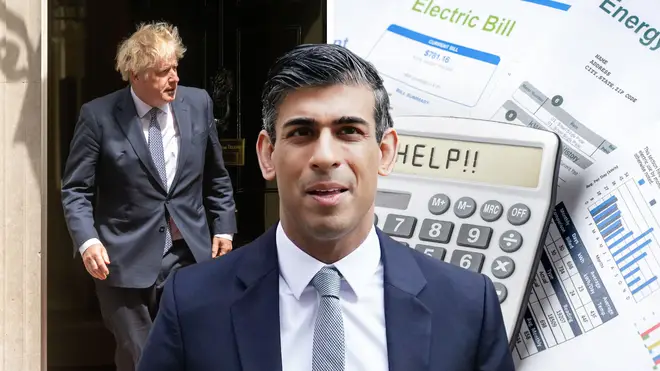
Iain Dale 10am - 1pm
28 May 2022, 00:05 | Updated: 28 May 2022, 00:54

Fears have been raised that the chancellors 'big expensive' £15bn cost-of-living package will have minimal impact due to inflation.
Mr Sunak unveiled a further £21 billion of support for households on Thursday after a surge in energy bills and increasing shop prices led to demands for the UK Government to step in and help people which includes a £400 discount on energy bills for every household in Britan.
The Chancellor, who has been slammed by some Tory MPs for "throwing red meat to socialists", said other rich individuals who do not need financial assistance from the Government should donate the £400 to charity.
Read more: Irate caller fumes over millionaires getting £400 fuel grant
Mr Sunak, who last week appeared on The Sunday Times Rich List with his wife Akshata Murty for the first time with their joint £730 million fortune, was questioned about what would happen to his £400 grant.
He told ITV's Good Morning Britain: "I'm sure you will join me in giving that money to charity."
But when questioned if he would be following suit and donating his grant money, the Prime Minister said it works differently for him.
He told reporters during a visit to Stockton-on-Tees: "I think my arrangements are different because I live in a Government flat.
"But I think it's important that people should recognise these payments will not necessarily cover the increased costs fully. "We can't cover every single cost that people are going to pay, we've got to be realistic about that.
"However, they will go a long way towards helping people."
Read more: Windfall tax on energy firms explained: How do I get Rishi Sunak's new £400 discount?

Caller - country has gone berserk with Sunak's £400 rebate
Mr Sunak told the Commons he had considered an alternative of a targeted council tax rebate but it was felt this could see people who live in high-value homes but who still need financial support losing out.
He said if wealthy people can do without the Government handout then they should give it to charity - something he said he will be doing.
“So actually this being universal means that we avoid all of those problems and really do get help to everyone who needs it and you, like me, I am sure like me, you can also give that money to charity if you don’t need it," he told Sky News.
There were also concerns that a £400 discount on energy bills for every household in the country, regardless of how well off they are, would further fuel inflation which is already heading towards 10%.
Paul Johnson, director of the Institute for Fiscal Studies, said while the impact of a one-off series of measures would be limited, the Chancellor could come under pressure to repeat it in future years.
Read more: Former CBI chief: Rishi’s £400 for bills is the 'right thing' in a perfect economic storm

Nick Ferrari pokes holes in Rishi Sunak's cost of living support
Under Mr Sunak's plan, almost all of the eight million most vulnerable households could receive at least £1,200 of support, including a previously announced £150 council tax rebate.
The measures include a one-off £650 payment to low-income households on benefits, paid in two instalments in July and the autumn, at a cost of £5.4 billion.
Pensioners will also receive a £300 payment in November/December alongside the winter fuel payment in a move costing £2.5 billion, while £150 will be paid by September to individuals receiving disability benefits.
Mr Sunak said £5 billion of the package would be paid for by a levy on the profits of oil and gas giants, and around £10 billion will be covered by extra borrowing.
Announcing the measures in the Commons, Mr Sunak told MPs it was worth £15 billion, but officials later conceded there was a hidden £6 billion cost to the announcement, taking it to £21 billion.
That is because over the next five years the original £200 rebate for energy bills, which was announced in February and doubled and turned into a grant by the Chancellor on Thursday, will no longer be paid back by consumers as originally planned.